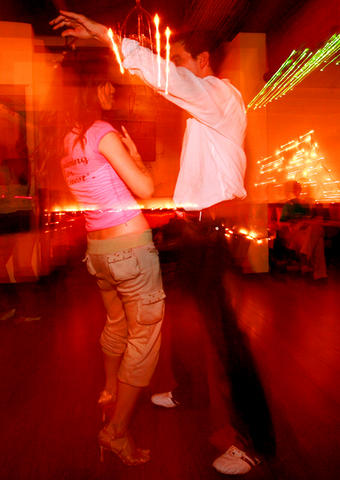Two bodies cling to each other, move seductively, spin and gyrate to the pounding beat of music till the room can barely take the heat. The salsa enthusiasts have danced the Latin dance in Taipei for years, and, this weekend, will be joined by the top-notch artists and instructors from South Korea and India, Senegal and Norway as part of the First Taipei Salsa Festival.
Like salsa clubs spreading across places as diverse as New York, Dubai and Japan, the event celebrates the dance form with days of workshops and nights of performances that aim to attract dancers from around the world. Invited performers will lead the crowd in thirty courses on different types of salsa from elementary to advanced levels and ignite the weekend with Latin heat at two demonstrations.
According to Jessica Ku (古婉君) of the Taipei Salsa Association (台北莎莎舞蹈文化推廣協會), the event's organizer, the Cuban dance first appeared in the city around five years ago, mostly taught by ballroom denizens and thus leaned more toward the glamorous LA style that takes in movements from ballroom dancing.

PHOTO: COURTESY OF DANCE FORUM TAIPEI
More styles - such as the New York "breaking on two" style and Cuban freestyle that echoes the daring spirit of street dance salsa - have been brought in by foreign instructors and made popular by the growing numbers of its practitioners.
To South Korean salsa artist and instructor Sol Hwang, salsa's street credit renders it a comprehensive form open to all artisans as each dancer can blend in different inspirations to express his or her ideas. A ballet dancer by training, Hwang has mastered various dance forms such as samba, capoeira and tango during his treks around the globe and created salsa moves combining materials from contemporary dance to hip-hop.
"Salsa is all about connecting and communicating with others through the body, heart and soul," said Hwang, who has been dancing for more than 20 years and teaching salsa on and off for the past two and half years in Taipei.
Similarly, Knzo of Senegal is another versatile artist proficient in reggaeton, ragga jam, African dance and dancehall. The world salsa champions, Oliver Pineda and Luda Kroitor, from Australia, excel at the other end of the salsa spectrum with their precise and sophisticated techniques. Adding more sass to the lineup is Luis Vazquez, one of the founders of LA style salsa, as well as karma salsa, a genre invented by Kaytee Namgyal, an Indian salsa guru.

The canonical shot of an East Asian city is a night skyline studded with towering apartment and office buildings, bright with neon and plastic signage, a landscape of energy and modernity. Another classic image is the same city seen from above, in which identical apartment towers march across the city, spilling out over nearby geography, like stylized soldiers colonizing new territory in a board game. Densely populated dynamic conurbations of money, technological innovation and convenience, it is hard to see the cities of East Asia as what they truly are: necropolises. Why is this? The East Asian development model, with

June 16 to June 22 The following flyer appeared on the streets of Hsinchu on June 12, 1895: “Taipei has already fallen to the Japanese barbarians, who have brought great misery to our land and people. We heard that the Japanese occupiers will tax our gardens, our houses, our bodies, and even our chickens, dogs, cows and pigs. They wear their hair wild, carve their teeth, tattoo their foreheads, wear strange clothes and speak a strange language. How can we be ruled by such people?” Posted by civilian militia leader Wu Tang-hsing (吳湯興), it was a call to arms to retake

This is a deeply unsettling period in Taiwan. Uncertainties are everywhere while everyone waits for a small army of other shoes to drop on nearly every front. During challenging times, interesting political changes can happen, yet all three major political parties are beset with scandals, strife and self-inflicted wounds. As the ruling party, the Democratic Progressive Party (DPP) is held accountable for not only the challenges to the party, but also the nation. Taiwan is geopolitically and economically under threat. Domestically, the administration is under siege by the opposition-controlled legislature and growing discontent with what opponents characterize as arrogant, autocratic

Desperate dads meet in car parks to exchange packets; exhausted parents slip it into their kids’ drinks; families wait months for prescriptions buy it “off label.” But is it worth the risk? “The first time I gave him a gummy, I thought, ‘Oh my God, have I killed him?’ He just passed out in front of the TV. That never happens.” Jen remembers giving her son, David, six, melatonin to help him sleep. She got them from a friend, a pediatrician who gave them to her own child. “It was sort of hilarious. She had half a tub of gummies,